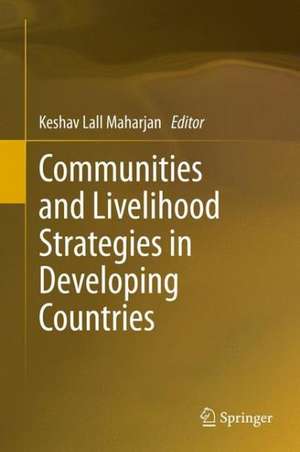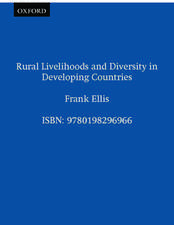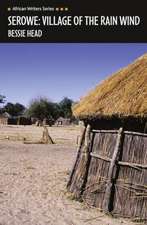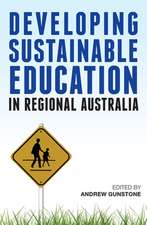Communities and Livelihood Strategies in Developing Countries
Editat de Keshav Lall Maharjanen Limba Engleză Hardback – 24 mar 2014
| Toate formatele și edițiile | Preț | Express |
|---|---|---|
| Paperback (1) | 636.12 lei 6-8 săpt. | |
| Springer – 23 aug 2016 | 636.12 lei 6-8 săpt. | |
| Hardback (1) | 644.18 lei 6-8 săpt. | |
| Springer – 24 mar 2014 | 644.18 lei 6-8 săpt. |
Preț: 644.18 lei
Preț vechi: 757.85 lei
-15% Nou
Puncte Express: 966
Preț estimativ în valută:
123.27€ • 131.81$ • 102.77£
123.27€ • 131.81$ • 102.77£
Carte tipărită la comandă
Livrare economică 17 aprilie-01 mai
Preluare comenzi: 021 569.72.76
Specificații
ISBN-13: 9784431547730
ISBN-10: 4431547738
Pagini: 208
Ilustrații: XXV, 178 p. 54 illus., 50 illus. in color.
Dimensiuni: 155 x 235 x 22 mm
Greutate: 0.52 kg
Ediția:2014
Editura: Springer
Colecția Springer
Locul publicării:Tokyo, Japan
ISBN-10: 4431547738
Pagini: 208
Ilustrații: XXV, 178 p. 54 illus., 50 illus. in color.
Dimensiuni: 155 x 235 x 22 mm
Greutate: 0.52 kg
Ediția:2014
Editura: Springer
Colecția Springer
Locul publicării:Tokyo, Japan
Public țintă
ResearchCuprins
Communities and Livelihood Strategies: An Overview.- Climate Change Impact on Revenue of Major Food Crops in Ghana: Structural Ricardian Cross-Sectional Analysis.- Climate Variables and their Impacts on Yield of Food Crops in Makwanpur and Ilam District of Nepal.- Adoption of Improved Rice Varieties in the Tarai Region of Nepal.- Effects of Environmental Factors on Cattle Milk Production among Smallholder Households in Ala-Buka, Kyrgyzstan.- Farmer’s Perception on Impact of Organic Farming on Yield and Income of Vegetables: A Case Study in Kathmandu Valley and Chitwan District of Nepal.- Riverbed Vegetable Farming for Enhancing Livelihoods of People: A Case Study in the Tarai Region of Nepal.- Income Generation through People’s Participation: Kitchen Gardening Practices of Three Marginalized bagdi Villages in Bangladesh.- Post Mount Merapi Eruption Recovery of Smallholder Dairy Farming: A Case Study of Disaster Management in Indonesia.- Capacity of Rural Institutions in Implementing Decentralized Development in Indonesia: Case of Three Villages in Purbalingga District, Central Java Province.
Textul de pe ultima copertă
Sustainability of rural communities is threatened by a plethora of factors including climate change and disasters which interact in an intricate manner in making rural people vulnerable and poor. This book is the output of empirical research on communities and livelihood strategies in developing countries. It reveals how rural communities are functioning and earning their livelihoods by making the best use of the resources, local/internal, or external/new, and the combination of the two to counteract the various challenges they face, with the ultimate goal of becoming resilient to local or global shocks and sustaining that resilience. Local governance is identified as crucial in ensuring sustainable livelihoods as it ensures healthy collaboration between communities, on the one hand, and civil society and those communities, on the other hand, in promoting self-sustaining development trajectories. Similarly, the role of social capital is not ignored as it brings in community drive and a sense of purpose, direction, and solidarity among community members which facilitates problem solving in periods of crises and disasters.
Caracteristici
Discusses innovative livelihood and agricultural innovation adoption by farmers, including efforts to propagate organic farming Shows the impact of changing climate on crop yields and short- and long-term revenues of farmers with adequate incorporation of adaptive responses in Ghana and Nepal Assesses rural institutions, namely, village officers, neighborhood groups, village parliament and village development committees and community-based self-help initiatives to sustain decentralized rural development Includes supplementary material: sn.pub/extras












